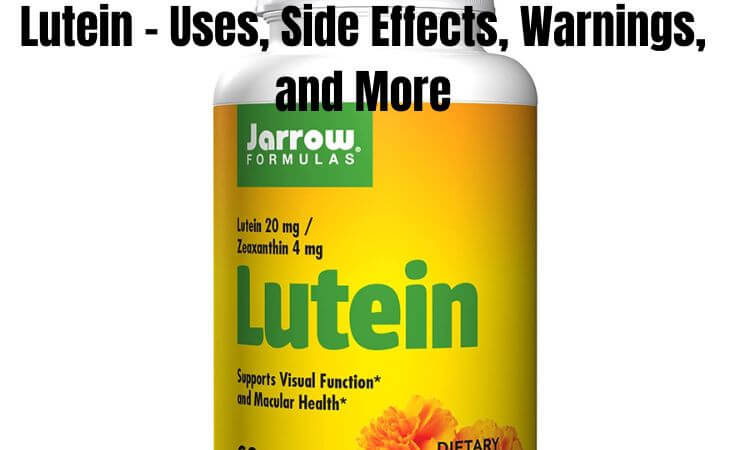Table of Contents
Lutein – Uses, Side Effects, Warnings, and More
lutein benefits,lutein tablets,lutein vitamin,lutein for eyes,lutein side effects,lutein and zeaxanthin,lutein foods,lutein for eye floaters,lutein benefits,lutein vitamin,lutein tablets,lutein and zeaxanthin,lutein for eyes,lutein foods
Overview
Carotenoid is the classification given to the organic pigment known as lutein. It is connected to vitamin A and beta-carotene in some way. Lutein is often referred to as “the eye vitamin” by many people.
One of the two primary carotenoid pigments that are found in human eyes is called lutein (macula and retina). It is believed to perform the role of a light filter, thereby preventing the eye tissues from being damaged by direct sunlight. Egg yolks, spinach, kale, corn, orange pepper, kiwi fruit, grapes, squash, and zucchini are some examples of foods that are high in lutein content.
Lutein is a popular antioxidant that is taken orally to prevent a variety of eye problems, including cataracts and a condition that can cause vision loss in elderly people (age-related macular degeneration or AMD). Lutein is used for a variety of other ailments, but there is insufficient evidence from credible scientific studies to support these additional applications.
What Are the Benefits and Applications?
Possible Usefulness in Regards to
a degenerative eye condition that is most common in people over the age of 60 (age-related macular degeneration or AMD). Some of the symptoms of AMD can be alleviated by taking lutein supplements orally for a period of up to three years. It is possible to detect additional benefits when it is taken for a period of at least three months at dosages that are greater than five milligrammes and when it is coupled with other carotenoid vitamins. On the other hand, lutein does not appear to prevent AMD from progressing over time.
DO NOT MISS: Taurine – Uses, Side Effects, Warnings, and More
Cataracts. There is a correlation between increasing the amount of lutein in one’s diet and a decreased likelihood of acquiring cataracts. However, it is unclear whether or whether persons who already have cataracts can benefit from taking lutein supplements orally.
It’s Possible That This Won’t Work for
A respiratory condition that is common in infants and children (bronchopulmonary dysplasia). It has not been shown that oral administration of lutein and zeaxanthin to preterm newborns can lessen the risk of developing bronchopulmonary dysplasia (BPD).
A severe intestinal condition that can affect newborns born prematurely (necrotizing enterocolitis or NEC). It has been shown that giving lutein and zeaxanthin orally to preterm newborns does not prevent NEC.
An eye ailment that runs in families and is characterised by impaired night vision and a loss of peripheral vision (retinitis pigmentosa). Oral administration of lutein does not result in an improvement in vision or any other symptoms experienced by retinitis pigmentosa patients.
A condition that affects the eyes of premature infants and can lead to blindness (retinopathy of prematurity). It is not possible to prevent retinopathy of prematurity by orally administering lutein and zeaxanthin to premature neonates.
There is considerable interest in applying lutein to a variety of additional functions; however, there is insufficient trustworthy data to determine whether or not this would be beneficial.
Adverse Reactions
When used orally, there is a good chance that lutein will not cause any adverse effects. It appears that consuming up to 20 milligrammes of lutein on a daily basis, either as part of the diet or as a supplement, is safe.
Important Safety Instructions and Cautionary Notes
When used orally, there is a good chance that lutein will not cause any adverse effects. It appears that consuming up to 20 milligrammes of lutein on a daily basis, either as part of the diet or as a supplement, is safe. When consumed in the amounts that are naturally present in food, lutein is probably safe for use during pregnancy and breastfeeding.
When administered orally in the recommended doses, lutein is probably safe for children to consume. A particular product (LUTEINofta, made by SOFT Italia SpA) that contains 0.14 mg of lutein on a daily basis has been used risk-free in newborns for a period of 36 weeks.
What are the interactions?
At this time, we do not have any information regarding LUTEIN’s interactions.
Dosage
Lutein can be found in a wide variety of foods, such as egg yolks, spinach, kale, corn, orange pepper, kiwi fruit, grapes, zucchini, and squash, to name a few examples. One cup of cooked kale contains 44 milligrammes of lutein, while one cup of cooked spinach contains 26 milligrammes, and one cup of broccoli contains 3 milligrammes.
Lutein is also taken in supplements. Adults have been known to take doses ranging from 10 to 20 milligrammes of it orally on a daily basis for up to three years. Many multivitamins contain lutein. They often deliver a somewhat low dose, such as 0.25 mg per pill, as their standard offering. When consumed in conjunction with a meal that is heavy in fat, lutein is absorbed into the body more effectively. Talk to a medical professional if you want to find out which kind of treatment or dosage would be most appropriate for a particular problem.



